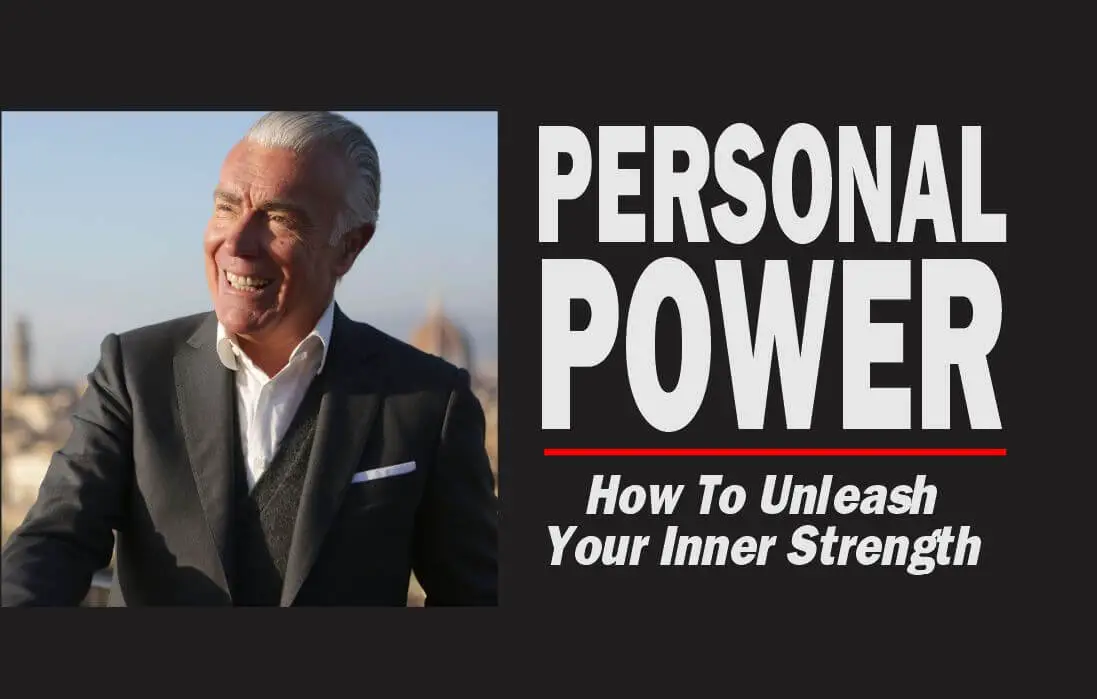Last updated on May 5th, 2025 at 08:12 pm
Develop and wield personal power by recognizing and utilizing your personality, characteristics, knowledge, and skills.
With personal power, you can influence your life and the world around you with the accompanying self-awareness, confidence, and taking responsibility for your choices.
By developing your power, you can achieve your goals, create the life you want, and make a positive impact.
This guide will show you how to develop and wield this inherent power for success and fulfillment.
Key Takeaways
- Personal power empowers you to influence events and people through your character and skills.
- Qualities like self-awareness, confidence, resilience, empathy, and leadership enable you to leverage personal power effectively.
- The benefits of harnessing personal power include increased influence, confidence, respect, control, resilience, and self-awareness.
- Strategies such as cultivating self-awareness, building confidence, practicing assertiveness, and setting boundaries, can help you harness and launch your power for success.
Table of Contents
- Key Takeaways
- What is Personal Power?
- Four Types of Personal Power
- Qualities of People with Self Power
- Benefits of Having Personal Power
- How to Harness and Launch Personal Power
- Overcoming Obstacles to Personal Power
- Conclusion
What is Personal Power?
Personal Power Definition
Personal power is the ability to influence events and people through your own skills, knowledge, and personal attributes, rather than through formal authority or position. It is the power that comes from within you based on your competence, confidence, and character.
“Personal power is not about being fearless, but rather about facing your fears and taking action despite them.”
– Oprah Winfrey
Four Types of Personal Power

The four types of personal power include the following:
Intrinsic Power
Intrinsic power is the personal authority and influence that comes from within you, such as through your knowledge, confidence, or values. This type of power is self-generated and based on internal strengths.
Extrinsic Power
On the other hand, extrinsic power is derived from external sources, such as position, wealth, or relationships.
It is granted to you by others or by societal structures. While intrinsic power is more sustainable and enduring, extrinsic power can be easily gained or lost.
Balancing both forms of power can help you leverage your strengths and achieve your goals effectively.
Related: Understanding the Complexities of Interpersonal Relationships
Expert Power
Expert power is based on a person’s knowledge, skills, or expertise in a particular subject or field.
This type of individual power is derived from your credibility and ability to influence others through your competence and expertise.
Referent Power
Referent power on the other hand is based on your interpersonal skills, charisma, and ability to build relationships with others.
This type of self power comes from your likability, trustworthiness, and ability to connect with and inspire others through your charisma and personality.
Related: Developing Positional Power For Organizational Impact
Qualities of People with Self Power

People with self power possess several key qualities that enable them to achieve their goals, overcome obstacles, and make a positive impact on the world.
Some of these qualities include:
- Self-awareness: People with self-power have a deep understanding of themselves, their values, and their goals. They are aware of their strengths and weaknesses and can use this knowledge to make better decisions.
- Confidence: If you have individual power, you are confident in your abilities and are not afraid to take risks or pursue your goals. You believe in yourself and your potential to achieve great things.
- Resilience: Having self-power will enable you to recover from setbacks and failures. You view challenges as opportunities for growth and can learn from your experiences.
- Empathy: People who have developed their self-power can connect with others and understand their perspectives. They can build strong relationships and inspire others to achieve their goals.
- Supporting Others without Validation: This power helps you to support others without the need for reward or acknowledgment.
- Quiet Leadership: Also, personal power can show leadership skills without being at the front and still impact the people.
Benefits of Having Personal Power
Developing your personal strength can put you in a position of advantage and you are emotionally strong to face any situation.
Here are some benefits:
- Influence: Self-power allows you to exert influence and persuade others, making it easier to achieve goals and advance in various areas of life.
- Confidence: Having self-power boosts self-confidence and self-esteem, enabling you to take on challenges and overcome obstacles with ease.
- Respect: If you have individual power, you command respect from others, creating an atmosphere of trust and collaboration in both personal and professional relationships.
- Control: Individual power gives you a sense of control over your own life, making you to make decisions confidently and assert your boundaries.
- Resilience: Possessing self-power helps your recover from setbacks and adversity, sustaining a sense of resilience and determination to keep moving forward.
- Increased Self-awareness: Embracing self-power involves taking responsibility for your own life and making choices that align with your values and goals.
Related: Reward Power: The Art of Using Rewards for Motivation
How to Harness and Launch Personal Power

Now that we understand the importance of this type of power, let’s discuss some practical strategies for harnessing and launching your personal power to achieve your goals and create the life you desire.
Cultivate Self-awareness and Emotional Intelligence
Self-awareness is the ability to recognize and understand your thoughts, feelings, and behaviors, while emotional intelligence is understanding your emotions and those of others and using the information to act accordingly.
By having self-awareness and emotional intelligence, you can better understand your strengths, weaknesses, and motivations.
Develop Confidence
Confidence is one of the key elements of individual power. To increase personal power, it is important to work on building self-confidence.
This can be achieved by setting realistic goals, taking on new challenges, and focusing on accomplishments rather than failures.
Practice Assertiveness
Assertiveness is the ability to express your thoughts, feelings, and needs directly and respectfully.
Developing assertiveness can help increase individual power by allowing you to stand up for yourself, set boundaries, and communicate effectively with others.
Set Boundaries
Setting boundaries is essential for maintaining personal power. Personal boundaries help to protect your time, energy, and emotions from being drained by others.
It is important to clearly define your boundaries and communicate them to others in a respectful way.
Take Care of Yourself
Self-care is crucial for increasing and harnessing your personal strength and power.
This includes taking care of your physical, emotional, and mental well-being.
Practicing self-care can help you stay grounded, reduce stress, and increase your overall sense of personal power.
Take a Personality Test
Another way to improve your strength is to understand your personality to know your inner strengths.
There are many different personality tests available online that can help you identify your strengths and weaknesses.
Some popular tests include the Myers-Briggs Type Indicator and the big five traits of personality.
Related: The Use and Abuse of Coercive Power: A Close Look
Overcoming Obstacles to Personal Power
Let us now discuss how to overcome obstacles that hinder personal strength and how to maneuver them.
1. Negative Self-talk and Limiting Beliefs
Overcoming negative self-talk and limiting beliefs can help overcome obstacles that hinder your personal strength.
It involves recognizing these thoughts and beliefs as they occur, challenging their accuracy, and replacing them with positive affirmations.
2. Fear of Failure or Rejection
To overcome obstacles to personal strength and power, you must overcome the fear of failure or rejection. You must reframe these experiences as opportunities for growth and learning, rather than as reflections of your self-worth.
3. Comparison with Others and Feelings of Inadequacy
Also, overcoming comparison with others and feelings of inadequacy can help neutralize obstacles that hinder individual power.
This has to do with recognizing and appreciating your unique strengths and qualities.
Practicing gratitude, mindfulness, and self-compassion can also help in building self-esteem and reducing feelings of inadequacy.
4. Lack of Assertiveness and Difficulty Setting Boundaries
Overcoming a lack of assertiveness and difficulty setting boundaries as described somewhere above helps to strengthen your defense against obstacles to personal strength.
You can achieve this through practicing assertive communication, setting clear boundaries, and putting yourself first.
Related: Related: The Ethics Of Social Power: Using Your Influence Responsibly
Conclusion
Personal power is the key to unlocking your inner strength and achieving success in different areas of life.
By harnessing and launching this power, you can overcome obstacles, pursue your goals with determination, and maneuver challenges with resilience.
Through self-awareness, a positive mindset, and effective goal-setting, you can tap into your unlimited potential and create a life filled with purpose, fulfillment, and happiness.
You need to believe in yourself and develop your power to unleash your true potential and thrive in today’s world.
References
- Brian Tracy: Personal Power: The Superpower Of Leadership
- Fingerprint For Success: Personal Power: How to Make Your Mark (without selling your soul)
- Forbes: 10 Steps To Own Your Personal Power
- People Builders: Personal Power: The Superpower of An Exceptional Leader
- Lifehack: How to Access Your Personal Power to Create Success
Pyo Merez (PsyD) is a distinguished adolescent and adult psychologist at the forefront of mental health advocacy.
With expertise in cognitive and developmental psychology, focusing on social relationships, cultural contexts, and individual differences, Pyo has dedicated his career to empowering adolescents and adults.
As a sought-after speaker and panelist, Pyo shares invaluable insights on issues affecting young people, contributing to a deeper understanding of mental health and well-being in today's society.


